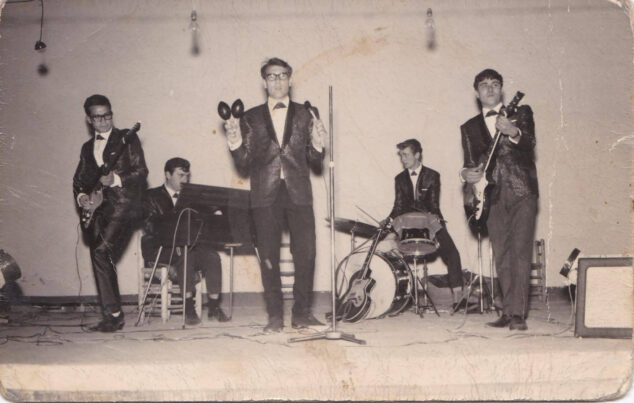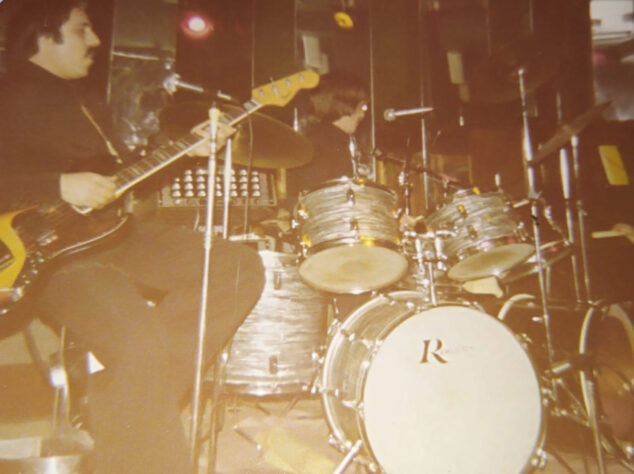It was the 60s and the Pigui-bacan musical group had been born in Dénia. American and English music at that time was beginning to take hold in Spain. The members of the group were barely 17 years old. They were Diego Puig, Vicente Catalá, José Montaner, Bautista Contrí and another person who would mark a before and after in the musical history of the city: Antonio Arnau, precursor of the electric guitar in Dénia.
Some of the members had begun their journeys in music in a very different field: «Since we were young we started in the tuna, each one played an instrument; Then, over time, the Pigui-bacan group emerged," Antonio Aranu tells Dénia.com.
"You're going to laugh," says the musician when he tells how the name came about, which was the result of uniting the components that played: piano, guitar, drums and singer. It was one of the pioneering musical groups that were formed in Dénia and that would set the trend in the following years.
Arnau's milestone was introducing the electric guitar to the Dianense city in the early 60s. The instrument, invented by the American engineer Lloyd Loard in 1920, did not become popular in Spain until that decade. Therefore, the fact that a group had the opportunity to have this instrument made it stand out from the rest.
«The idea came from José Montaner, the drummer. "He told my father to buy me the guitar and that we would pay for it in four days," says the musician. His father went to Valencia by train and bought it. "The guitar and the amplifier cost 3.000 pesetas and, in fact, we paid for it in three performances," he explains.
But how did he learn to play it without any reference in the city? Arnau remembers that there was a man who knew how to play the guitar and who lived for Marines, then every afternoon I went to his house and taught him. This is how she managed to master the instrument.
«I was from the Les Roques neighborhood and playing it there was very strange because the neighbors had never heard anything like it; The whole neighborhood came to see how it sounded,” explains the guitarist about people's amazement at this instrument.
The success of the Pigui-bacan
After the Pigui-bacan began playing with electric guitar, other musical groups joined the rock wave. The group performed with versions of songs of this style, as well as ballads and a lot of Italian music. In order not to disturb the neighborhood, the rehearsals were held in a country house near the Sisters' school. Carmelitas.
His first performance was in 1962 on Radio Gandía, in the program "El Domingo a las 11". Afterwards they began to perform at the Palladium nightclub in Dénia and then other opportunities would come, such as the tour through the province of Valencia that they did accompanying Chico Valento, a well-known Spanish rock and roll singer from the late 50s. "We played there for four or five years every summer, three months a day,” says Antonio about the Palladium.
Some leave and others come: new musical groups
As time went by and as usually happens, each one took their own path, some members even went to Germany. But Arnau, 20 years old at the time and always wanting music, formed another group called Los Brujos Negros, so popular that another was later created in Ondara with the same name. José Montaner and Vicente Catalá remained in this new formation and Francisco Estalrich joined.
Los Brujos Negros finally dissolved and in the 80s Los Drei were formed, with Ramón Puig on piano and vocals, Toni Arnau on bass and vocals, and drummer Pepe Montaner. With this group they gave many performances in the halls of La Felicidad, in addition to working for failures and events such as communions or baptisms.
Goodbye to music
Antonio Arnau finally left music in the 90s, but he remembers that stage of his life fondly: "It was very fun, wonderful, everyone supported us."
In 2016 he received an award from the Nova Companyia de Guitarres with the collaboration of the Department of Culture of the Dianense City Council for his work as a musician and for being a pioneer in Dénia in the interpretation of the electric guitar.
Although now - at 77 years old - he no longer plays, every day he admires the bass that he has hanging on the wall of his house and it brings back such good memories.









Eren Massa els Pigui-Bacan.. Forever.!!